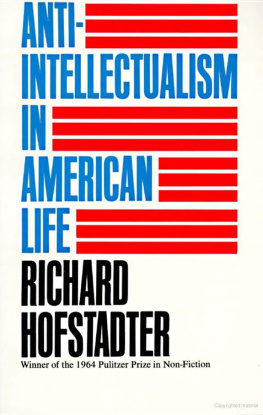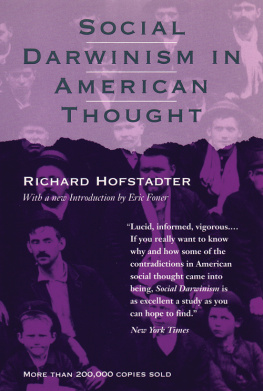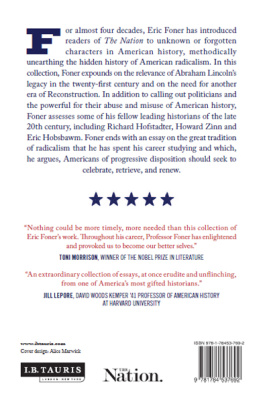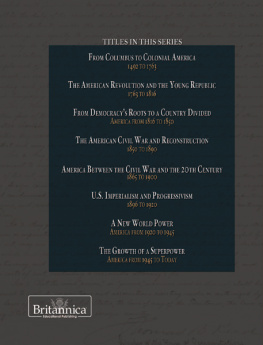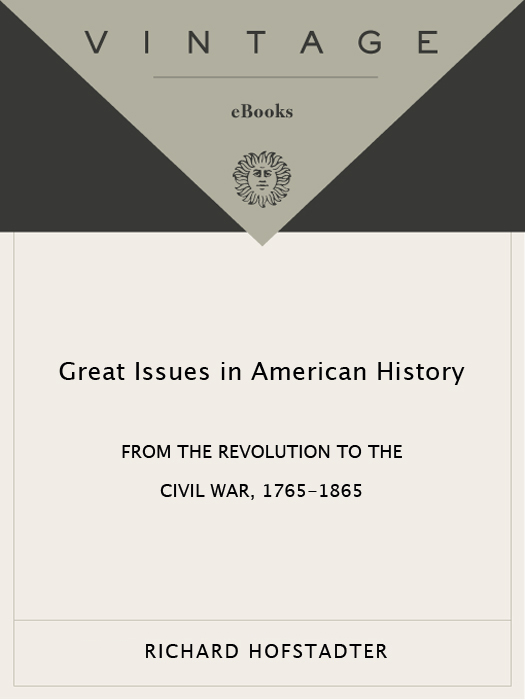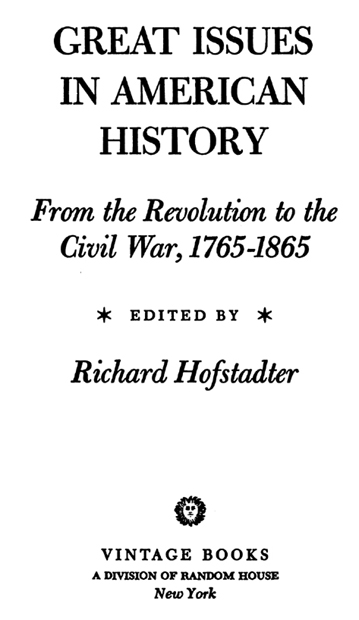VINTAGE BOOKS EDITION, 1958
Copyright 1958, by Richard Hofstadter
All rights reserved under International and Pan-American Copyright Conventions. Published in the United States by Alfred A. Knopf, Inc., New York, and Random House, Inc., New York, and simultaneously in Canada by Random House of Canada Limited, Toronto.
eISBN: 978-0-307-80970-4
v3.1

To My Father
Preface
THESE documentary selections are intended to provide a generous sampling from the major political controversies in American history. I hope that the general introductions, together with the headnotes supplied for each selection, will serve to set the documents in their historical context in such a way as to make it possible for a reader with a modest knowledge of American history to read them profitably and without further supplement. But the volumes have been planned with special concern for the interests and needs of undergraduates who will have occasion to use them in connection with a textbook or a general survey of American history. With this in mind, I have not tried to make my general introductions into a collective history of American politics, nor even into histories of the particular issues I have chosen to illustrate; they are simply brief glosses on a few issues of central importance. They will serve their purpose if they refresh the memory of the general reader and assist the student in establishing the links between these sources and his other readings.
It has been my purpose to concentrate on political controversy. I have not tried to include the texts of statutes, which are available in reference books and are usually well summarized for the students purposes in general books; nor have Iexcept in the cases of a few documents whose special importance seemed to demand their inclusionreprinted purely illustrative materials. Almost everything in these volumes can be described as argumentative. These documents reproduce the words of major actors of American political historywhether judges, statesmen, legislative bodies, or private individuals of influenceengaged in debating issues of central importance. It has not been possible to include all the historical issues that may be considered important. To achieve such inclusiveness seems less desirable than that every issue selected should be discussed in some depth in the chosen documents, and that opposing views should be adequately represented.
Of necessity, the documents have been edited, and the ellipses indicate omitted portions. But I have tried to avoid snippets. Where severe selection from a larger text has been necessary, enough has been included in each case to give a coherent sample of the original argument at the point at which the author was stating the novel or essential portions of his case. Some small amount of modernization has been imposed on most documents written before about 1815.
I am grateful to my wife, Beatrice Kevitt Hofstadter, who generously took time from her own work in progress to help me collate and edit these documents and prepare the commentaries; and to Gerald and Dorothy Stearn for editorial assistance at every stage in the preparation of the manuscript.
March, 1958
R. H.
 Contents
ContentsINTRODUCTION
INTRODUCTION
INTRODUCTION
INTRODUCTION
INTRODUCTION
INTRODUCTION
INTRODUCTION

PART I

Revolution and Independence
BY 1763, when the French and Indian War ended, the American colonies had grown to be a strong and thriving part of the British empire, whose people were passionately concerned to manage their own affairs. In the past they had been accustomed to a large measure of regulation of their trade by Parliament. But some of the inconvenient regulations, notably those on the trade with the French West Indies, had been regularly evaded by smugglers, and British officials had dealt very indulgently with violators of the law. Parliament had never taxed the colonists for the sake of revenue. Taxes, in the form of duties, had been imposed in the course of regulating trade, but these taxes were not passed to raise money, and it was understood that they were only incidental to regulation.
After 1763, the successive ministries that set policy in London felt that England could no longer afford to be as easy-going as in the past. The empire was expensive; costly wars had been fought to acquire and defend it; still more money would have to be laid out in the future to garrison it. From the British point of view, much of the outlay had been made in the interests of the colonies, and the home government felt it to be only just that the colonists should share in the immense tax burden borne by British subjects at home. Moreover, when smuggling, which had been tolerated before the war, continued to be carried on during hostilities, it became an act of treason. Therefore, in 1764 Parliament passed the Sugar Act, which was intended to end this illegal trade as well as to produce a revenue, and in 1765 passed the Stamp Act, which it was hoped would raise 60,000 a year.
For the Americans this new and firmer policy could hardly have come at a more inauspicious time. The presence of the French in Canada had always driven the colonists toward the mother country. Now, with the common enemy expelled, the colonists felt free to assert themselves. The Sugar Act and the Stamp Act found them in the midst of a post-war business depression and in a touchy mood. The colonists had always had to struggle to improve a currency supply that was inadequate to their needs; now the new taxes threatened to make this struggle even harder. Moreover, the illegal West Indies trade had long been one of the best sources of business profits and hard money for the northern colonies. Southern planters too, who were continually in debt to their British merchant creditors, were beginning to feel restive. And the Stamp Act, which affected all colonies in the same way, united them around a common grievance. The devices used to enforce the Sugar Act gave American merchants a legal issue which shrewd colonial lawyers were quick to exploit. In the past, colonial smugglers, when brought to trial could look forward to almost certain acquittal. American juries would not convict them. Now violators were to be tried in the vice-admiralty courts, which had no juries. The Americans felt that by losing the benefit of jury trials they were deprived of one of the fundamental rights of Englishmen, acquired over long centuries of struggle for liberty.


